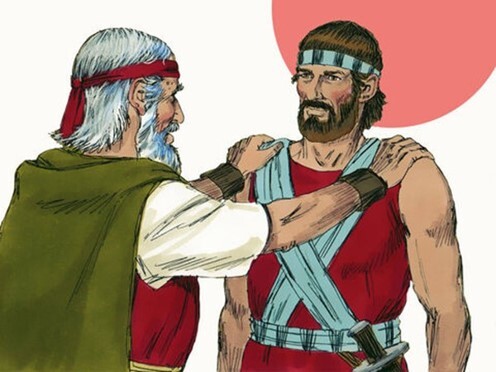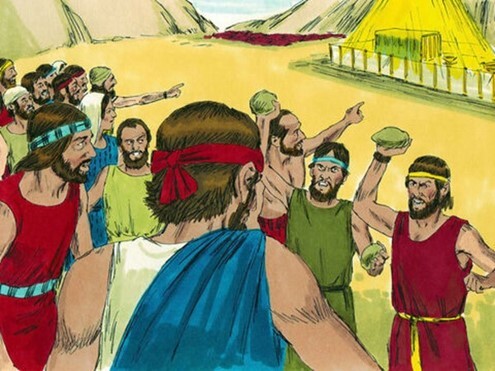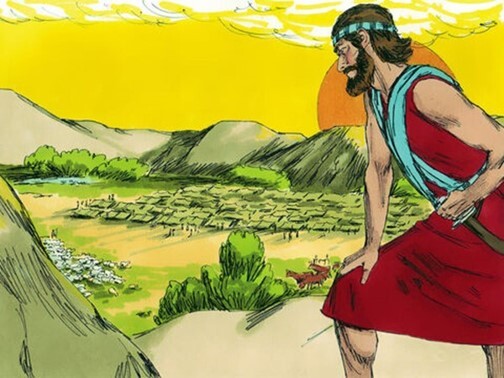“Have I not commanded you? Be strong and courageous. Do not be afraid; do not be discouraged, for the LORD your God will be with you wherever you go.” (1. Joshua 1:9)
Imagine stepping into shoes so large you feel like a child trying to walk in them. Moses, the towering leader of Israel, had just died. He was the man who had stood before Pharaoh, commanded plagues with God’s authority, parted the Red Sea, and spoken with God face to face. He had led a nation out of slavery, given them God’s law, and guided them for forty years through wilderness and wandering. No one could imagine Israel without Moses.
And now, in his place, stood Joshua. Younger, less experienced, and fully aware that he was no Moses. The people stood on the very edge of the Promised Land, the same land their parents had glimpsed decades earlier but had refused to enter because of fear. Even Moses had not succeeded in leading them into it. Now Joshua had to do what even Moses could not.
Think of the pressure: to lead a restless and often rebellious nation into enemy territory, facing fortified cities, legendary giants, and countless uncertainties. The weight must have been crushing.
That’s why God’s first words to Joshua were not strategies for battle or political instructions, but a simple command paired with a profound promise:
“Be strong and courageous… Do not be afraid; do not be discouraged, for the LORD your God will be with you wherever you go.” (Joshua 1:9)
This was not mere encouragement—it was covenant assurance. Joshua’s courage would not come from his own strength, but from God’s presence and promises.
Let us explore three truths from Joshua’s story:
1. Fear Distorts What We See
2. Faith Sees Through God’s Eyes
3. Strength and Courage Flow From God’s Promise
1: Fear Distorts What We See
Forty years before Joshua stood at the Jordan River, ready to lead Israel into the Promised Land, Moses had sent twelve spies to scout the territory. They all saw the same land—fertile valleys, strong cities, and grapes so large they had to be carried on poles. It was truly a land flowing with milk and honey, just as God had promised. Yet, despite witnessing the same evidence, their conclusions were completely different.
Ten of the spies could not see beyond the obstacles. The cities looked too fortified. The people seemed too strong. And the giants—the descendants of Anak—filled them with dread.
Numbers 13:33 records their report:
“We seemed like grasshoppers in our own eyes, and we looked the same to them.”
Notice their words: “in our own eyes.” Before the enemy even saw them, they had already declared defeat in their hearts. Fear distorted their vision. Though they had once seen God split the Red Sea, rain manna from heaven, and bring water from a rock, their fear shouted louder than their memory of God’s power.
Fear spreads quickly. Ten fearful voices outweighed the courage of the two faithful spies, Joshua and Caleb. Their words ignited panic among the people, turning a nation of over a million away from God’s promise. That night the people wept and rebelled, crying, “If only we had died in Egypt!” (Numbers 14:2).
And so, instead of stepping into the blessing before them, Israel wandered in the wilderness for forty years—until that entire unbelieving generation passed away.
We are not so different. Fear still distorts our vision today. It magnifies problems and minimizes God’s presence. It whispers lies: “You are too small, too weak, too unworthy.” It convinces us that obstacles are insurmountable and that God’s promises are out of reach.
Like the Israelites, we can find ourselves focusing on the giants instead of the God who is greater than giants. Fear can paralyze us into inaction, causing us to miss opportunities and blessings that God has already prepared for us.
But Scripture reminds us that fear is never from God. 2 Timothy 1:7 declares:
“For God has not given us a spirit of fear, but of power and of love and of a sound mind.”
When fear distorts, it leads us to retreat. But when faith sees, it leads us forward. Joshua learned this truth as a spy, and decades later he would need that same faith to lead Israel across the Jordan.
The lesson is clear: fear may be powerful, but it does not have the final word. When we let fear define us, we see ourselves as grasshoppers. But when we let God define us, we see ourselves as His children—carried by His promises, empowered by His presence, and destined for His victory.
2: Faith Sees Through God’s Eyes
Joshua knew fear firsthand—he had been one of the twelve spies who once walked through Canaan. He saw the same giants, the same fortified cities, and the same dangers that terrified the others. But while ten spies saw defeat, Joshua and Caleb saw possibility. They looked not only at the size of the giants but also at the power of the God who had promised victory.
Numbers 14:8–9 records their response:
“If the LORD is pleased with us, he will lead us into that land, a land flowing with milk and honey, and will give it to us. Only do not rebel against the LORD. And do not be afraid of the people of the land, because we will devour them. Their protection is gone, but the LORD is with us. Do not be afraid of them.”
Faith does not deny the reality of giants; it sees them through the lens of God’s greatness. Where fear shrinks us down to grasshoppers, faith lifts our eyes to the Almighty.
We see this perspective throughout Scripture. In 2 Kings 6, the prophet Elisha and his servant were trapped in Dothan, surrounded by the Aramean army. The servant panicked, crying, “Oh no, my lord! What shall we do?” But Elisha calmly replied, “Don’t be afraid. Those who are with us are more than those who are with them.” Then Elisha prayed for his servant’s eyes to be opened, and suddenly he saw hills full of horses and chariots of fire surrounding the enemy. Faith revealed a greater reality: God’s armies had already secured victory.
Jesus modeled this same vision in Gethsemane. When soldiers came to arrest Him, Peter drew his sword in fear, cutting off the servant’s ear. But Jesus healed the man and rebuked Peter:
“Do you think I cannot call on my Father, and he will at once put at my disposal more than twelve legions of angels?” (Matthew 26:53)
Jesus could see what Peter could not: heaven’s hosts ready to intervene if He willed it. Jesus saw beyond the moment of arrest to the greater plan of salvation unfolding in fatih.
Faith, then, is not blind optimism. It doesn’t pretend giants aren’t real or deny that battles are hard. Instead, it looks at those same realities and declares: “The LORD is with us.” It sees God’s power, God’s promises, and God’s presence overshadowing the obstacles before us.
This is why Paul could write in 2 Corinthians 5:7, “For we live by faith, not by sight.” Faith is not about ignoring what we see but trusting the unseen God who rules over it all.
Giants may still stand. Armies may still surround. Circumstances may still seem impossible. But faith allows us to see through fear to the greater reality of God’s presence and power. With God, victory is not only possible—it is assured.
3: Strength and Courage Flow From God’s Promise
When Joshua stood on the banks of the Jordan River, the task before him was overwhelming. He had to lead a nation into hostile territory, conquer fortified cities, and succeed where Moses himself had fallen short. God’s message to him repeated three times in Joshua 1 was clear: “Be strong and courageous.”
But notice this carefully—God did not tell Joshua to conjure up bravery from within himself. This was not a call to mere positive thinking or self-confidence. It was a call to trust God’s promises. Joshua’s courage was not to be rooted in his personality but in God’s Word, God’s presence, and God’s covenant.
A. God’s Word
God told Joshua:
“Be careful to obey all the law my servant Moses gave you; do not turn from it to the right or to the left… Keep this Book of the Law always on your lips; meditate on it day and night” (Joshua 1:7–8).
Strength comes when our lives are anchored in God’s truth. God’s Word steadies us when circumstances shake us. Joshua’s leadership would not depend on clever strategies but on obedience to God’s revealed will. Likewise, Psalm 119:105 reminds us: “Your word is a lamp to my feet, a light on my path.”
- God’s Presence
God promised Joshua:
“As I was with Moses, so I will be with you; I will never leave you nor forsake you.” (Joshua 1:5)
Joshua had seen how God walked with Moses—parting seas, providing manna, guiding by cloud and fire. Now God promised that same presence to him. Courage is born not from our independence but from knowing we never stand alone. Jesus echoed the same promise in Matthew 28:20:
“Surely I am with you always, to the very end of the age.”
- God’s Covenant
Finally, Joshua’s courage rested on God’s unbreakable covenant. This moment was not random—it was the fulfillment of God’s promise to Abraham centuries earlier. What God begins, He always completes. As Philippians 1:6 assures us:
“He who began a good work in you will carry it on to completion until the day of Christ Jesus.”
Joshua went on to do what Moses could not. By faith, he led Israel across the Jordan, where the waters parted just as the Red Sea had. He led them to march around Jericho until the walls fell—not by siege engines or weapons, but by obedience and faith. Victory after victory came, not because Joshua was brilliant, but because God was faithful.
Even in failure, such as Israel’s defeat at Ai, the lesson was clear: when they forgot God, they fell; when they returned to Him, they triumphed.
Our lives are the same. Fear still whispers, giants still loom, and failures still sting. But God’s command remains: “Be strong and courageous.” And His promise stands firm:
“The LORD your God will be with you wherever you go” (Joshua 1:9).
Strength and courage are not about us holding tightly to God but about trusting that He holds tightly to us.
Summary: Courage Through the Gospel
Joshua’s story teaches us that courage is not the absence of fear but the presence of faith. The difference between the ten spies and Joshua and Caleb was not what they saw but how they saw it. Fear distorted the vision of the many, but faith gave clarity to the few. Courage came not from ignoring the giants but from trusting the God who is greater than giants.
Strength, then, does not come from within us but from God’s promises. Joshua learned that obedience to God’s Word, confidence in God’s presence, and trust in God’s covenant were the foundations of courage. And yet, Joshua’s story ultimately points beyond himself. For even Joshua, with all his victories, could not bring lasting peace. Israel would falter again and again. The Promised Land was only a glimpse of something greater.
Jesus is the true and better Joshua. Where Joshua led God’s people into Canaan, Jesus leads us into eternal life. On the cross, He faced the ultimate enemies—not giants or armies, but sin and death itself. What looked like defeat became the greatest victory when He rose from the grave.
This is the Gospel—the ultimate promise of God. In Christ, we are never alone, never abandoned, never powerless. As Paul declares in Romans 8:31, “If God is for us, who can be against us?” Our courage is not rooted in our ability to control circumstances but in Christ’s victory already won for us.
So when God says, “Be strong and courageous,” it is not mere encouragement—it is covenant assurance. In Jesus, the battle has been decided. He is with us, and He has already overcome. Our courage flows from Him,
Let’s pray together.
Heavenly Father,
We thank You for the story of Joshua, a reminder that fear does not have the final word. You call us to be strong and courageous, not because of who we are, but because of who You are.
Forgive us for the times we fix our eyes on giants instead of You. Teach us to see through faith, as Joshua and Caleb did. Help us to trust Your promises, obey Your Word, and rest in Your presence.
We praise You for Jesus, the true Joshua, who conquered sin and death and now leads us into eternal life. Fill us with Your Spirit so that we may walk in courage, share Your love with others, and live as witnesses of Your victory.
We ask this in the strong name of Jesus Christ our Lord.
Amen.
“If God is for us, who can be against us?” (Romans 8:31)





